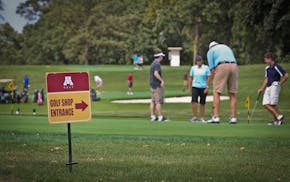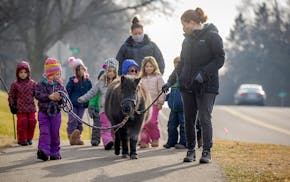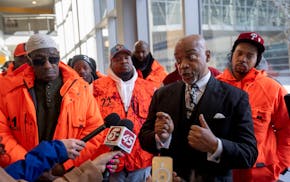MORGAN, MINN. – A crowd swelled out both sides of a large shed on a family farm in southwestern Minnesota for the first, maybe only, debate featuring Sen. Amy Klobuchar and Royce White, the GOP-endorsed, controversy courting candidate running for her Senate seat.
Farmfest is a summer ritual for farmers, rural residents and politicians, and Klobuchar — seeking her fourth term — opened by touting her support for federal farm policies, especially given falling corn prices, weather turbulence and avian flu.
"Our farmers have had our backs through hard times, engine of our economy, and we have to have your backs," Klobuchar said. "We need the safety nets in place."
Right away, White, a former NBA player and favorite of former Trump adviser Steve Bannon, whose fans sat front-row in sunglasses and "The Farmers Are Coming" T-shirts, called himself the "MAGA extremist" candidate and wasted no time in framing the farm debate in cultural terminology, saying "This is supposed to be a nation of shopkeepers and agrarian farmers."
On the question of the national response to animal pandemics, White pivoted to climate change.
"Part of the climate racket is that livestock is the issue," White said, in an oblique reference to the greenhouse gas emissions of cattle and management of manure. "Livestock is the issue. Slowly, but surely, your animals ― and you, as well ― will be deemed non-essential."
White faces a challenge from Joe Fraser, a Navy veteran and business executive, in the Aug. 13 primary. Wearing a broad-brimmed, white cowboy hat, Fraser avoided direct engagement with White and, instead, honed his criticism for the sitting senator two chairs down.
"The Biden-Harris-Klobuchar regime dropped the ball when we had the chance to expand our opportunities with the United Kingdom [on trade]," Fraser said. "The current administration left that one on the floor."
The lack of new, major trade deals for agriculture has been a recurring gripe on stage at Farmfest over the past two days.
Throughout the roughly 75-minute debate, White sat on one end of the table and Klobuchar on the other, with WCCO's Blois Olson asking questions. Each candidate was allowed one-minute responses. The format didn't give way to much back and forth, but occasionally candidates would roll their eyes or shake their heads at responses they didn't like.
During one telling exchange, Olson asked a question about policies around easing the workforce shortage in the U.S.
White, first to respond, said, "Second law of thermonuclear dynamics. The inexorable rise of China. The decline in your communities, the decline in this country, is not by accident."
When everyone on stage had a chance to respond, including Klobuchar, who called for tweaking rules to the federal seasonal farm worker program, White interjected to say he wanted to answer the question, too. Klobuchar — and moderator Olson — informed him he'd already responded.
The discussion did hit commodity and trade topics, with Klobuchar calling to open up trade to Cuba, and Fraser knocking federal rules that, in his words, "dictate ... what you can and cannot do on your land."
Minnesota's agriculture engine, a nation-leading producer of turkeys and hogs, as well as one of the top exporters of agricultural products from ethanol to wheat around the world, is largely entrenched in a global marketplace.
On policy, Klobuchar, the only sitting federal lawmaker on the stage, highlighted the policies she's worked on that could help Minnesota farmers with trade.
Asked what could be done to expand global trade, Klobuchar spoke about her bipartisan Promoting Rural Exports Act that would create a Rural Export Center at the U.S. Commercial Service to help rural businesses access international markets to increase their exports.
She also talked about another bipartisan bill, the Freedom to Export to Cuba Act, that would lift the U.S. trade embargo on Cuba to allow for more American exports to the country, including farming exports.
"That could be a huge market for Minnesota farmers," Klobuchar said of her Cuba bill. "We should open up Cuba [agriculture] for us."
But several of the seven candidates on stage sought to peel back this global reach, focusing on domestic topics.
Rebecca Whiting, a Bemidji farmer running as a Libertarian, noted economic tough times in rural areas, discussing the closure of a grocery store in Bemidji.
"The best thing that you could do for anyone on Social Security is to not have food deserts," Whiting said. "Where I live, we're a low income area, there's not enough access to grocery stores, and the food that you can get is extraordinarily overpriced unless you want to go to Walmart."

Thompson found guilty of murder in car crash that killed 5 young women

University of Minnesota is putting its golf course up for sale

St. Paul sees 'unprecedented' day care closures, sending families scrambling

